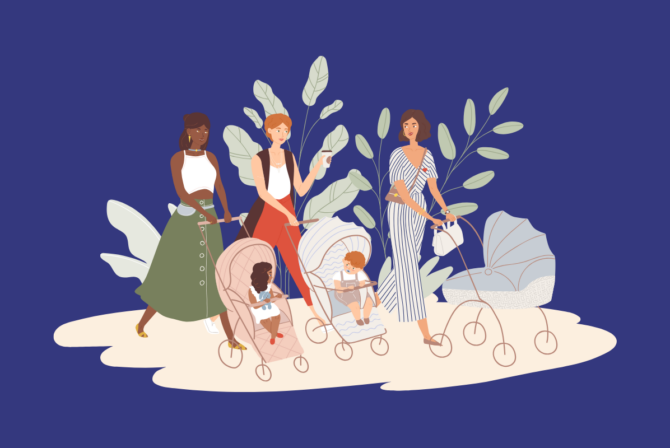
The original cover, and its updated look
In January, thousands of families, including my own, will receive a copy of Bim and Bom: A Shabbat Tale by Daniel J. Swartz from The PJ Library. The book takes the ubiquitous Shabbat song (you know the one – bim, bom, bim, bim, bim bom, bim bim bim bim bim bom, bim bim bim – well, you get the idea) and transforms it into a tale of a builder (Bim) and a baker (Bom) who race across town every Friday at sunset to welcome the Sabbath together. The book has been around for a while. But the edition that’s coming in the mail in January was created at The PJ Library’s behest with brand-new, updated illustrations.
When I first heard that an old Shabbat story was being modernized with new pictures, I was a little chagrined. I hold very dear the dated Jewish books that my mother shared with me (most of which were dated even back in the early 1970’s) and that I now share with my 5- and 7-year-old daughters. The knee-highs and frilly aprons sketched alongside the stories of What the Moon Brought may no longer be fashionable, but that doesn’t mean I want to see Ruth and Debbie in matching Uggs and leggings.
and that I now share with my 5- and 7-year-old daughters. The knee-highs and frilly aprons sketched alongside the stories of What the Moon Brought may no longer be fashionable, but that doesn’t mean I want to see Ruth and Debbie in matching Uggs and leggings.
When it comes to passing Judaism on to my children, I’m all about nostalgia. I like to replicate the experiences I had as a child, which are often the experiences my mother, and sometimes even her mother, had as children. This means that I hand grate the potatoes for latkes instead of using the Cuisinart, and every Friday night I reach for my great-grandmother’s sturdy brass candlesticks instead of the funky (and gorgeous) pewter ones we received as a wedding gift. Old Fashioned? Maybe. But that’s part of what makes these rituals feel meaningful to me.
Bim and Bom: A Shabbat Tale, however, is not a relic from the 40’s, or even the 70’s. (Although it sure sounds like it from the title, doesn’t it?) The first edition was actually published by Kar-Ben Publishing in 1996, and the original illustrations are not so much old fashioned as, well, just a wee bit drab. (Sorry, Kar-Ben, you know I love you. And not just because you publish my books.) And The PJ Library didn’t so much update them as improve them. They gave us a book that’s nice to look at.
 This new and improved edition reminds me that I should feel comfortable, and perhaps even obligated, to tweak some Jewish traditions before passing them on to my children. I don’t need to update my favorite old books and songs, or even my favorite method for making latkes, for the sole reason that they are out-of-date. If they were wonderful then, they are probably wonderful now. (And I really do think hand grating is a better way to make latkes, so long as you aren’t too attached to the skin on your knuckles.) But I don’t have to copy detail for detail the traditions that I didn’t love or don’t work for me. After all, how can I teach my children to adore something that I’m only lukewarm about at best?
This new and improved edition reminds me that I should feel comfortable, and perhaps even obligated, to tweak some Jewish traditions before passing them on to my children. I don’t need to update my favorite old books and songs, or even my favorite method for making latkes, for the sole reason that they are out-of-date. If they were wonderful then, they are probably wonderful now. (And I really do think hand grating is a better way to make latkes, so long as you aren’t too attached to the skin on your knuckles.) But I don’t have to copy detail for detail the traditions that I didn’t love or don’t work for me. After all, how can I teach my children to adore something that I’m only lukewarm about at best?
So whether it’s something as simple as my grandmother’s mondel bread recipe (care for a dry brick, anyone?), or something as important as Shabbat services, I should always seek out excellence rather than settle for mediocrity. There’s no value in feigning enthusiasm for a sub-par product. Because as every parent knows, feigned enthusiasm is almost never contagious.
Our family is extraordinarily grateful to The PJ Library for the two books we receive every month, adding a whole new world of Jewish literature to sit alongside my treasured copies of K’tonton and All of A Kind Family. As a parent and a writer, I’m just as grateful for the message they have sent to the publishing world and the Jewish community as a whole – that Jewish books, and Jewish traditions, never have to be mediocre.
Now if only they can find me a delicious recipe for mondel bread…..
Head over to our blog, Raising Kvell, to discuss this book with others!
 This piece is part of our monthly series with The PJ Library. The PJ Library program sends Jewish-content books and music on a monthly basis to families with children through age eight. Created by The Harold Grinspoon Foundation in partnership with local Jewish organizations and philanthropists, The PJ Library is available in more than 130 communities across North America.
This piece is part of our monthly series with The PJ Library. The PJ Library program sends Jewish-content books and music on a monthly basis to families with children through age eight. Created by The Harold Grinspoon Foundation in partnership with local Jewish organizations and philanthropists, The PJ Library is available in more than 130 communities across North America.







